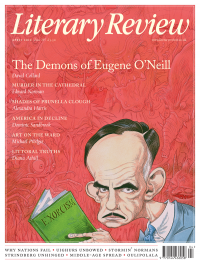Sam Kitchener
Teenage Baroque
Stonemouth
By Iain Banks
Little, Brown 357pp £18.99
Iain Banks’s fiction has always been flush with the joys of genre, only, they have often seemed incidental to the matter at hand. Ever since his debut, The Wasp Factory (1984), his novels have brimmed with lurid, gothic violence frequently inflicted on a particular family or community, as though the result of an ancestral curse. Except, rather than terrifying his characters into evasive action, this gore only baffles or amuses them. It’s a brief distraction from the typical concerns of realist fiction: getting laid and drunk on the one hand, thinking and noticing on the other.
Also often present are the plot devices of a noir thriller: a mystery, for instance, that the protagonist is engaged in solving at significant personal risk. Except they’re not normally that engaged in solving it. Prentice McHoan in The Crow Road puts off investigating his Uncle Rory’s disappearance as he

Sign Up to our newsletter
Receive free articles, highlights from the archive, news, details of prizes, and much more.@Lit_Review
Follow Literary Review on Twitter
Twitter Feed
Under its longest-serving editor, Graydon Carter, Vanity Fair was that rare thing – a New York society magazine that published serious journalism.
@PeterPeteryork looks at what Carter got right.
Peter York - Deluxe Editions
Peter York: Deluxe Editions - When the Going Was Good: An Editor’s Adventures During the Last Golden Age of Magazines by Graydon Carter
literaryreview.co.uk
Henry James returned to America in 1904 with three objectives: to see his brother William, to deliver a series of lectures on Balzac, and to gather material for a pair of books about modern America.
Peter Rose follows James out west.
Peter Rose - The Restless Analyst
Peter Rose: The Restless Analyst - Henry James Comes Home: Rediscovering America in the Gilded Age by Peter Brooks...
literaryreview.co.uk
Vladimir Putin served his apprenticeship in the KGB toward the end of the Cold War, a period during which Western societies were infiltrated by so-called 'illegals'.
Piers Brendon examines how the culture of Soviet spycraft shaped his thinking.
Piers Brendon - Tinker, Tailor, Sleeper, Troll
Piers Brendon: Tinker, Tailor, Sleeper, Troll - The Illegals: Russia’s Most Audacious Spies and the Plot to Infiltrate the West by Shaun Walker
literaryreview.co.uk